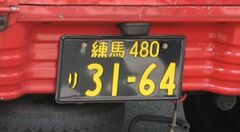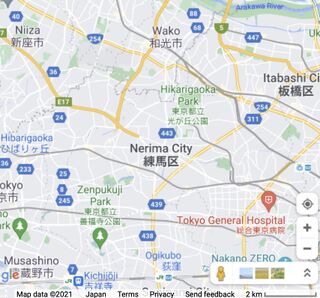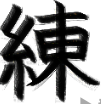Neri
Neri is set of the following Unicode characters:
X7DF4 練 [2], KanjiLiberal
XF996 練 [3], KanjiConfudal
XFA57 練 [4], KanjiConfudal
They have similar graphical representation, similar sounds (often, "neru" or "neri") and similar meaning: to practice, treatment.
Also, term Neri may refer to each of characters mentioned above and/or
their writing with Hiragana, ねる or ねり, and/or
their pronunciation and/or their meaning.
Confusion
There are 3 similar characters and 4 similar pictures at the top figure.
In principle, one could make the bijection between the three characters and some three of the four pictures.
Practically, this does not happen: each of the four pictures at the top can be attributed to each of the three Neri characters.
Even a native Japanese speaker, watching characters
練,
練,
練,
is unlikely to answer:
Which of them is X7DF4?
Which of them is XF996?
Which of them is XFA57?
At the doubts, the correct specification of the character is
"X7DF4 練 or XF996 練 or XFA57 練"
Such a construction is long and difficult to use.
Notation Neri is defined above, as short substitute of this long construction.
Some software also confuse these characters.
Silently, without any warning,
character
XF996 練
or
XFA57 練,
may be automatically substituted, replaced to X7DF4 練.
In particular, at the default setting of mediawiki, it is not possible to load separate articles for with names corresponding to all the three Neru:
An attempt to access an article named
練 (XF996)
or
練 (XFA57)
automatically redirect to article 練 (X7DF4).
This may cause the need to access the kanjis by their hexadecimal numbers
X7DF4,
XF996,
XFA57.
In order to trace the unauthorized substitutions, some programming is necessary.
The Utf8 encoding of the characters mentioned can be calculated by the PHP program ud.t activated with command
php ud.t 7DF4 F996 FA57
The output is
7DF4 32244 練 練
Unicode character number 32244 id est, X7DF4
Picture: 練 ; uses 3 bytes. These bytes are:
XE7 XB7 XB4 in the hexadecimal representation and
231 183 180 in the decimal representation
F996 63894 練 練
Unicode character number 63894 id est, XF996
Picture: 練 ; uses 3 bytes. These bytes are:
XEF XA6 X96 in the hexadecimal representation and
239 166 150 in the decimal representation
FA57 64087 練 練
Unicode character number 64087 id est, XFA57
Picture: 練 ; uses 3 bytes. These bytes are:
XEF XA9 X97 in the hexadecimal representation and
239 169 151 in the decimal representation
X7DF4 練
Among the Neru characters, X7DF4 練 seems to be most popular.
At least, it is presented both in
Jisho [5]
and in
Nihongomaster [6].
The phonetic and semantic parts of article X7DF4 練 are not repeated here.
Nerima

None of these dictionaries mention appear of neri characters at the vehicle license plates.
At the license plate, the combination looks similar to 練馬.
Such a combination refers to the specific place, Nerima prefecture near Tokyo.
Word Nerima may refer to the following combinations of kanjis:
At some computers (Macintosh), all the six words look the same.
The Second case, id est, 練馬, seems to be most popular in the internet articles.
References
- ↑ https://www.google.com/maps/@35.7720669,139.5463016,12.08z
- ↑ https://util.unicode.org/UnicodeJsps/character.jsp?a=7DF4 練 7DF4 CJK UNIFIED IDEOGRAPH-7DF4 Han Script id: restricted confuse: 練 , 練 , 練 ..
- ↑ https://util.unicode.org/UnicodeJsps/character.jsp?a=F996 練 F996 CJK COMPATIBILITY IDEOGRAPH-F996 Han Script id: allowed confuse: 練 , 練 , 練 ..
- ↑ https://util.unicode.org/UnicodeJsps/character.jsp?a=FA57 練 FA57 CJK COMPATIBILITY IDEOGRAPH-FA57 Han Script id: allowed confuse: 練 , 練 , 練 ..
- ↑ 5.0 5.1 https://jisho.org/search/%23kanji%20練 練 14 strokes Radical: silk 糸 (糹) Parts: | ハ 小 幺 日 木 田 糸 practice, gloss, train, drill, polish, refine Kun: ね.る、 ね.り On: レン Jōyō kanji, taught in grade 3 JLPT level N2 788 of 2500 most used kanji in newspapers Words starting with 練 Words ending with 練 Words containing 練 External links Stroke order On reading compounds 練習 【レンシュウ】 practice, training, drill, (an) exercise, workout 練達 【レンタツ】 expert(ise), skill, dexterity 修練 【シュウレン】 training, drill, practice, practising, discipline 水練 【スイレン】 swimming practice Kun reading compounds 練る 【ねる】 to knead, to thicken into a paste (stirring over a flame), to polish (a plan, etc.), to refine, to elaborate, to work out, to train, to drill, to exercise, to gloss (silk), to soften, to degum, to tan (leather), to temper (steel), to walk in procession, to parade, to march 練り 【ねり】 kneading, gloss, tempering, paste (e.g. bean paste, mustard paste), parading of portable shrines and floats at festivals 練り上げる 【ねりあげる】 to knead well, to polish, to refine
- ↑ https://nihongomaster.com/dictionary/kanji/2913/練 練 14 Strokes Radicals: | 糸 幺 小 日 ハ 木 JLPT Level 2 Definition of 練 practice gloss train drill polish refine Readings On'Yomi (音読み) Kun'yomi (訓読み) レン ねる ねり Popular Words With This Kanji 練習, れんしゅう practice, practise 訓練, 訓連, くんれん practice, practise, training 練る, 煉る, ねる to knead, to thicken into a paste (stirring over a flame), to polish (a plan, etc.), to refine, to elaborate, to work out, to train, to drill, to exercise, to gloss (silk), to soften, to degum, to tan (leather), to temper (steel), to walk in procession, to parade, to march 試練, 試煉, 試錬, しれん test, trial, probation, ordeal, tribulation 洗練, 洗煉, 洗錬, せんれん polish, refinement 熟練, じゅくれん skill, dexterity, proficiency 未練, みれん lingering affection, attachment, regret, regrets, reluctance 練り直す, 練りなおす, 練直す, ねりなおす to knead again, to rework, to revise, to polish ..
- ↑ http://www.licenseplatemania.com/landenpaginas/japan.htm Japan OVAL : J Passenger series Trade series Motorcycle series Mini-car series Diplomatic series Foreign travel series Other series Passenger series .. Current passenger series since August 1962 in yellow on black. The registration consists of one Japanese letter in smaller format, followed by two numerals, a hyphen and two numerals. At the top of the plate are three Japanese letters followed by three numerals. The two Japanese letters above the registration indicate the prefecture, in this case Tokyo (Nerima). The number above the registration denotes the vehicle class where a two digit number is issued since 1998. 480 (400-499) on a yellow on black plate stands for commercial use 4 wheel trucks up to 660 cc.
Keywords
Japanese, Kanji, KanjiConfudal, KanjiLiberal, KanjiRadical, Neri, Nerima, Uma, Unicode, X7DF4 練 , XF996 練 , XFA57 練 ,





